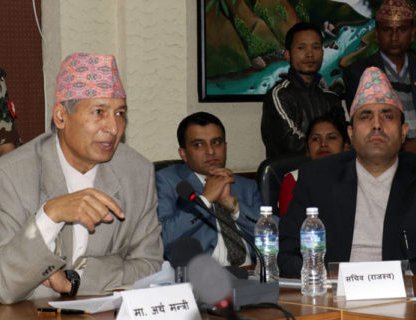
Background
Now that Finance Minister, Dr. Yubaraj Khatiwada , has come out with the promised White Paper on the Economy we must thank him profusely for it. Thank him also for making a realistic assessment of the state of the economy and the grave challenges as we move to a federal polity; along with saying just how badly economic governance has been managed by his predecessors
To begin with, he has bravely stopped mentioning the long drawn cliche, prompted, collectively, by the World Bank, IMF and ADB, that our macroeconomic fundamentals are sound. Remarkably, he has pointed out how the Paris Declaration on Aid Effectiveness (2005) is not worth the paper it is written on as the agreed principle of transparency, ownership and mutual accountability are grossly breached by donors. Where very little capital formation takes place nationally as most aid monies are taken back in such manner as vehicle procurement, study tours. training and consultancy services. Huge amounts of foreign aid by donors and, even more by INGOs are not included in the national Budget!
It would appear that Finance Minister is not impressed with the liberalisation undertaken in 1990. Nor, indeed, from our joining the WTO where we did so mainly with the grand hope of bringing substantial FDI into our economy, which has no happened. Only FDI can compensate for the very low level of national household savings.
Just how dark the macroeconomic scenarios is easily witnessed by the acute liquidity crisis faced by the banking sector and the recourse to their cartelization by the Nepal Bankers’ Association. And the helplessness of the Nepal Rastra Bank to anything about it. The inevitable Budget deficit and the need to borrow from the NRB and the general public by the Ministry of Finance to pay for its recurrent expenses will lead to overcrowding of the private sector and its liquidity needs to adversely affect capital formation. One way out is for the Ministry of Finance to sell out state enterprises like Nepal Airlines, Nepal Telecommunications, ADB; and to introduce a National Lottery Scheme along with promoting and developing a National Bond Market and, additionally, making a big push to allow the private sector to start leasing and financing companies, which will help immensely the SMEs and commercial farmers for their vital equipment needs to upgrade their technologies.
Foreground
Given the above, it is truly time now for us to dialogue and debate the economics of national interest and move out of the intellectual hold of the so-called Washington Consensus in keeping with the vast geo-economic, geopolitical; and geo psychological shifts in the global economy and society. This calls for politicians, bureaucrats, the private sector and think tanks to jointly contribute to the national economic agenda and its priorities based on our relates and needed priorities.
We must agree on a National Agenda on Finance and towards this, I humbly set forth the following to start the national debate and dialogue on desired new role and nature of the Ministry of Finance
AGENDA NO I: To recognise that with dependency on aid, it leads to loss of national vision, inferiority complexes and generally rent-seeking behaviour derived from aid; that aid is part of the problem and not part of the solution for good governance Aid bureaucracies, as well as national bureaucracies, must be downsized and right-sized by having just few core ministries that are constructed with the aim to have both strategic and macroeconomic impact. For example, the Ministry of Industry, Supplies and Commerce be appropriately amalgamated into Ministry of Finance and Economy while the Ministry of Agriculture henceforth be made responsible for agro-industrialization. Similarly, all bilateral aid be transferred to the Ministry of Foreign Affairs where it rightly belongs. Downsize the aid bureaucracies in situ and require them to hire national experts to man such offices. Nepal must seek aid forgiveness from donors owing to the high oat of aid projects whig has robbed Nepal of its competitive advantage. It should also limit the size of aid an divert it all to the social sector.
AGENDA NO 2: To maximize internal revenue mobilization and avoid between central and provincial authority remove the Depts of Customs, Internal Revenue, Excise from the Ministry of Finance and set it up as an autonomous National Revenue Authority with a Boar of Directors headed by the Minister of Finance, Secretary Finance, Secretary, Revenue etc . It will submit an Annual Plan guided by the Targets set by the Ministry. Its CEO will sign a performance contract(MOU) with the Minister laying down his personal performance targets. Similarly, other executives will be bound by similar performance contracts. Failure to meet performance targets will result in demotion or dismissal. The National Revenue Authority will be behaving its own recruitment, placement, transfer, remuneration, training policies and lay down its own salary and wages and incentives policies. Such innovations in Peru and Zambia, for example, had a revolutionary impact on resource mobilization. It is believed that this administrative reform will go a very, very long way in creating a ‘managerial civil service’ in Nepal and, in being empowered, to mobilise more than 20% GDP as revenue. This way the Ministry could be left to look after economic growth and development more holistically and not be too concerned about revenue loss as charged by other Ministries and the private sector.
AGENDA NO 3: It is estimated that in South Asia only 20% of GDP is accounted for by South Asia’s bond market, as compared to 45% by equity markets and 35% by bank assets. Contrast this with South Korea whose bond market is 114% of GDP. A national bond market is eminently needed to generate greater savings and investment for economic growth and employment, especially at the district/municipal level through local initiatives. .Experts agree that there is great scope for South Asia to deepen and widen its financial markets including local currency bond markets. This is particularly significant as Nepal is embarking on managed capital convertibility where both national FDI and FII is being allowed and many banks are promoting mutual funds as subsidiary ventures. Mutual Funds must be made income tax exempt. Further, promote local bond markets through People -Public-Private-Partnership (4PS).How may this be done? PPPP-projects that are commercially viable should be allowed to raise their capital by floating municipal bonds against firm pledges of fixed annual interest payments by the concerned people-public-private partnerships. This will provide ample opportunities for local banks and financial institutions to invest local savings locally— rather than sending them to Kathmandu (or elsewhere across the border).Naturally, when the national bond market is so underdeveloped it may be considered foolhardy to even think of local bond markets. Nevertheless, given the on-going global financial crisis, Nepal, along with all developed nations, must begin to think out of the aid box, so to speak. Bond markets are a way out. A possible innovation is to create locally-based Venture Capital Companies (VCCs) to buy and sell equities of local businesses locally. In this way, proprietorships and partnerships can be upgraded into private or public limited companies gradually –and the informal sector encouraged to become formal with new possibilities for debt and equity finance. These VCCs could also serve as business consulting enterprises to harness Nepal’s local entrepreneurial spirit from amidst all classes and castes. These VCCs can be created as private or public limited companies jointly owned by shareholders (say national and local governments, banks and financial institutions, individual promoters and also its employees), who should raise their capital from their own investments in sufficient manner to be able to meet the cost of operations; as well as raise debt finance to the extent of 40% of equity holdings. This debt finance can be drawn from a National Venture Capital Fund (NVCF)to be initially created by the Ministry of Finance where interested companies should be required to submit competitive bids for the loan of the funds from NVCF. The fund should mobilize soft loans from international financial institutions--- as well as utilize the aid amount remaining unutilized and, not least, aid funds remaining from the decision to discontinue aid projects. This modality will go miles to promote and develop the private sector in whatever ownership form desired by the private sector.Thus, it is expected that local venture capital companies (VCCs) will borrow from Govt at very nominal rates of interest but lend at market rates to their clients with a reasonable spread between loan and interest costs. All loans should be paid back after say 3 years, to be used in a revolving manner for the promotion of other venture capital companies in other districts spread equitably by region.It is expected that this innovation will help boost rural small industries and businesses as well as promote a culture of equity transactions that will contribute to stopping land fragmentation due to inheritance portioning. Through this financial innovation family, members will see the benefit of equitization of their land holdings as commercial businesses (rather than engaging in the partition of the land into uneconomical parcels as now prevails to the detriment of the local economy).
AGENDA NO 4: Deepen Debt Market and Enhance Monetary Independence. Three innovations are envisaged: (A)encourage lease finance (note: the fear of revenue loss must be weighed against the social costs of youth unemployment and alienation; further, the fact is that small businesses are not paying income taxes as yet) to benefit, in particular, the youth employment in the film, media and sports businesses, (2) small businesses engaged in logistic management—the structural weakness of a mountain economy ( in such areas as cold storage, warehouses, construction, auto-repair workshop that suffer from low productivity due to lack of capital investment and modern technology, (3) information technology (IT) businesses, (4) foreign employment loans and education loans for youth especially, and (5) acceptance of second mortgage financing provision by banks and finance companies, and (6) allowing access to Indian stock and bond markets for investments as well as mobilizing Indian portfolio investments and fdi--- on a balanced basis , if need be, by each bank or fi to safeguard from net capital outflows. (B)Negotiate with India to go into a managed flexible exchange rate system for the provision by them to Nepal of the required Indian Rupees credit to bring equilibrium in the balance of payments; hedge against currency speculation and deal with the likely inflationary impact on basic commodities on account of depreciation of Nrs through compensatory fiscal and monetary policies to subsidize imports and import substation agriculture production and industries. This will have the salutary impact by curtailing imports, promoting exports and further import substitution in the agriculture and manufacturing sector. Tourism will boom. Without an industrialization process, found mainly on forest and agro-industries Nepal, will not be able to be a modern developed economy: which it should strive to be by 2030 with manufactures with 20% share of GDP. (C) Government refrains from creating an Asset Management Company in the public sector. It is bound to be self-defeating and worse than the disease with the rampant graft and corruption that is guaranteed in such a state monopoly. As an alternative, encourage banks, with suitable incentives, to open their own private asset management companies for their asset securitization.
AGENDA NO 5: Strengthen Revenue Forecasting and Analysis in Ministry of Finance. Continuous, current data-based research and analyses need to be undertaken on a considerably sophisticated manner using well-known forecasting models to have a precise, firm overview of the revenue potential for Nepal as well as estimating the revenue and identification of causes. Such revenue forecasts must be made at the macro, meso (functional) and micro (tax office) levels to obtain a fuller comprehension of the revenue potential based on the national and local economic structures. Local Tax Offices need, therefore, to be provided with simple forecasting models as instruments with which they can estimate the revenue potential of each district by total and type of taxes and other levies. Maximum effort should be made to garnet ICT and GIS technologies locally by each tax administrator. Such knowledge will significantly improve the budgetary process with a solid framework (at both the national and local levels) as plans are not built around expected revenues but rather than expected expenditures as now. Ideally, plans should be built n the basis of both planned expenditure and revenue forecasts and traded off pragmatically. So weak is the revenue analysis in Nepal Govt that this innovation is a crying need that needs be given the topmost priority for which qualified human resources must be recruited, trained and developed.
AGENDA NO 6: Improve Budgeting and Expenditure Management Through Costing and Cost Control Modalities.. A noted shortcoming in the budgetary process is the ineffectiveness of monitoring with a view to linking the outputs with the inputs, which needs to be developed immediately: So too the need for outcomes to be measured against costs. This way financial and economic accountability will be more widened and deepened. This way we will be able to measure the efficiency, effectiveness as well as the impact of the budget on a sector or programme or project basis. Eventually, as important sectors of the economy move toward a sector programming approach --- a veritable missing link in our planning process due to the domination of it by the NPC and the ineffectiveness of the ministerial planning and coordination divisions--- it would be wise to innovate toward programme/performance budgeting for which costing studies and cost control mechanisms are vitally required innovations. Further, when we can do all this, then, foreign aid will surely be turned around from the stifling project approach towards a policy or programme-approach with full ownership by Nepal of nature, scope, content and process. In this manner, we move towards the desired ‘managerial civil service’ alluded to previously.
AGENDA NO 7: Fine-tuning of tax rates is necessary to pursue the general strategy of low taxes on income, property and imports with higher incidence on consumption as a compensatory measure. Dividend tax should be abolished to encourage savings and investment. So too abolish as many customs exemptions as is possible. Bring more retailers and whole sellers into the tax net and provided incentives to the local governments to mobilize the informal sector. Perhaps they may be allowed to levy, subject to central audit of the proceeds, a nominal turnover tax of say 0.5% of the monthly turnover of local business not registered in PAN. In order to advance fiscal devolution agricultural income above Rs 200000 per annum per household should also be taxed at 50% of the non-agricultural income tax. The proceeds should be 100% handed to the local governments at the ratio of 75% to the rural-metropolitan centres and urban metropolitan centers to make it politically palatable. A massive public relations campaign should be engaged in at the national level to motivate landlords---not to mention the urban middle class of lawyers, doctors, consultants etc--- should be provided with a feeling of pride that they are contributing to the development of their local community.
AGENDA NO 8: A) Re-introduce the policy of Land Banks as was laid down in 2005 Budget as a method for agriculture commercialization and creating a national market for land B) Allow foreigners to buy and sell apartments and C) invite FDI in retail trade.

Prof. Madhukar SJB Rana
Executive Director, SAIM Leadership & Executive Development Center and Former Finance Minister . He can be reached at madhukarsjbrana@gmail.com
- People Public Private Partnerships
- Nov 29, 2018
- An Alternative Meaning Of Inclusion And How Nepal Should Strategize
- Nov 20, 2018
- Nepal: A Country In Transition
- Aug 12, 2018
- The Fundamental Reality Of Our Currency Union With India With Its Pros And Cons
- Jun 12, 2018
- A Macroeconomic Assessment Of The 2018/19 Budget
- May 30, 2018
















